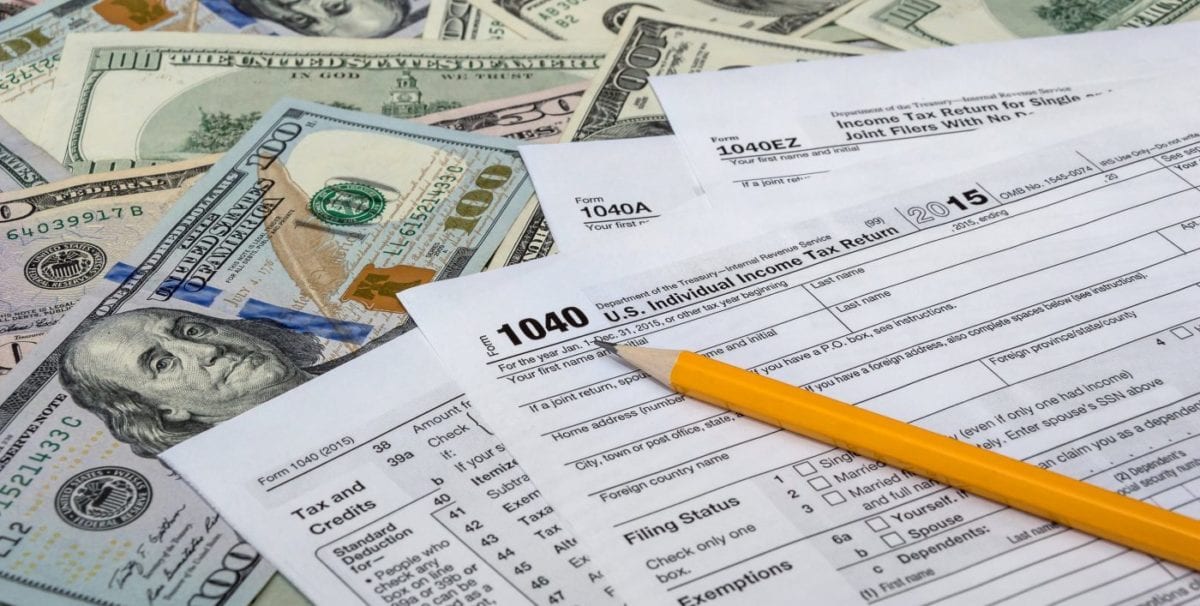Nothing's certain in life except death and … well, you know how the rest of that saying goes. Every year around this time, our mailboxes (and inboxes) get flooded with tax documents from various financial institutions, making sure we have the necessary paperwork to report all sources of income. But you know who you don't typically get tax documents from? Your credit card company.
One of the many great things about points and miles is that it's just a bunch of funny money. Even though they have very real (sometimes immense) value, they typically aren't treated as taxable income. That is … until the 1099 shows up in the mail. For those unfamiliar with Form 1099, it's a common IRS form used to report various types of income.
Whether or not you have to pay taxes on your credit card rewards boils down to how they were earned. Did you increase your points balance by spending on your card or through a big sign-up bonus? No need to let Uncle Sam know about that. Referred a friend to a new card and scored some points in the process? Now, that's a different story.
As you prepare your taxes this year, here's everything you need to know about when (and why) you should report your credit card rewards as income.
Related reading: How & When to Pay Your Taxes With a Credit Card
Welcome Offer Bonuses
Signing up for a new card with a big welcome offer bonus is what it's all about. Nothing will fuel your travels faster than getting a huge influx of points or miles after meeting your new card's spending requirement.
Those big bonuses – whether in the form of points, miles, or even cashback – have real value. They can be your ticket to far-flung destinations, free hotel stays, and much more.
It would seem logical that because they have value, they'd also be taxable – but thankfully, that isn't the case. Because these bonuses come with a minimum spending requirement – whether it's $500 or $5,000 – they're treated as a rebate on spending and, therefore, aren't considered taxable income. Just as the points you earn on your day-to-day spending are considered a rebate, the same is true for new card sign-up bonuses.
For example, the *venture x* is a wildly popular travel rewards card that has earned a spot in many traveler's wallets. If you're signing up for this card brand new, you can currently bonus_miles_full. Since Capital One miles can easily be used to cover travel charges at a rate of 1 cent per mile, it would make sense to value that bonus at $750. But since the Venture X card requires you to spend $4,000 in the first three months to earn that big bonus, that $750 worth of points isn't taxable income.
In this case, the banks and the IRS are viewing the bonus as a ~19% rebate on the spending you did to earn it. Without that spending requirement, you'd be on the hook for a couple hundred dollars in taxes, making the bonus offer less valuable.
See all the best credit card offers for travelers right now!
Referral Bonuses
Whether you're a points and miles beginner or a seasoned pro, you probably understand the benefits of having the right travel rewards credit card in your wallet. It only makes sense that you'd want to share that love with friends and family – and there's no better way to do so than through a new card referral. These referral bonuses are a great way to score extra points, all while helping a loved one get started earning travel rewards on their own.
Over the past year, some of the absolute best bonuses that we've seen on *amex platinum* and *amex gold* have only been available through targeted referral links. When it comes to Amex referrals, there's a maximum amount of points you can earn: 100,000 points per card, per year. Since the points you earn from a referral don't require any spending on your end, they aren't a rebate … and that makes them taxable.
This means that whether you earned 15,000, 50,000, or the maximum 100,000 points over the course of a year through referrals, you'll be on the hook for paying taxes on all those points. Even though Amex sets the cash redemption value of its Membership Rewards points at .6 cents per point, they value them at 1 cent each come tax time. This means that if you earned 100,000 points last year through referrals, you can expect a 1099-MISC for $1,000 in income.
Here's how it's spelled out in Amex's Referral Program (see terms & conditions):
“The value of the Referral Bonus may be taxable income to the Basic Card Member on the account that earns a referral bonus. The Basic Card Member is responsible for any federal or state taxes resulting from the Referral Bonus.”
Amex isn't alone in doing this, though; you'll also receive a 1099-MISC from Chase for referral bonuses … maybe. While this isn't laid out anywhere in the terms, we've seen some reports that suggest $600 is the threshold Chase has set for reporting these referral bonuses as income to the IRS and is only sending out 1099s for those that have reached that mark.
Here's how Chase discloses your tax responsibility in its referral terms:
“The value of this offer or program may result in miscellaneous income received from Chase and we may be required to send you, and file with the IRS, a Form 1099-MISC (Miscellaneous Information) or Form 1042-S (Foreign Person’s U.S. Source Income Subject to Withholding) for the year in which you participate and are awarded the benefits of the offer/program.”
The same goes for Capital One. If you sent a referral offer to a friend or family member last year to sign up, you undoubtedly received (or will be receiving) a 1099-MISC from Capital One.
Since Capital One miles can easily be redeemed for 1 cent each towards travel, it makes sense that the miles earned through these referral offers would be valued the same for tax purposes. And that's exactly the case. If you earned 50,000 Capital One miles last year through referrals, you'll need to claim that as income when it comes time to file your taxes with the IRS. And if you live in a state that also charges income tax, you'll need to claim it there as well.
Bank Account Bonuses
Bank account bonuses are almost universally considered taxable income. From time to time, banks will offer new customers a lump sum of money – similar to a new card welcome offer – for opening a deposit account and completing various requirements. Since these bonuses aren't tied to spending but rather the amount of money maintained in the account or other banking transactions, you can expect to receive a 1099-INT for the bonus amount come tax season.
But what about when a bank bonus is issued in the form of points or miles?
American Express is best known for its travel rewards credit cards but the bank does offer customers several other financial products, including checking and savings accounts. One such checking account, specifically designed for business owners, is currently offering a bonus of 30,000 Membership Rewards when you complete the following requirements:
- Deposit $5,000 or more within 30 days of account opening.
- Maintain an average account balance of $5,000 or more for the next 60 days.
- Make five or more qualifying transactions within 60 days of account opening.
What's noticeably missing from those requirements? Any sort of spending requirement. That means even though this bonus is issued in the form of Membership Rewards, it's not a rebate on spending and is considered taxable income.
Likewise, Bask Bank is an online-only bank that offers a savings account where you can earn American Airlines AAdvantage miles instead of traditional interest on your balance. While this is subject to change at any time, the Bask Mileage Savings Account currently earns 2 miles for every dollar saved annually. The account doesn't carry any monthly maintenance fees or deposit requirements, so you'll earn miles on every dollar in your account, no matter how many or few you have in it.

Miles are paid out monthly. So, for example, if you had $10,000 deposited in a Bask Mileage Savings Account for a full month, you'd be paid out 1,666 AAdvantage miles for that month. Over the course of a year, that's an extra roughly 20,000 AAdvantage miles.
Similar to the Amex Business Checking account, AAdvantage miles earned with Bask Bank aren't a rebate on spending and will, therefore, generate a 1099-INT come tax time. Putting an exact value on AAdvantage miles is a challenge – if you use them on one of our favorite sweet spots, you can easily get 2 cents (or more) in value for each of them.
Thankfully, Bask Bank typically takes a more conservative approach to valuing the miles. In previous years, the bank valued AAdvantage miles at .42 cents each for tax purposes. That means that if you earned 20,000 AAdvantage miles over a year with this type of savings account, you'd only be on the hook for an additional $84 worth of income.
How to Report 1099 Income
Whether you do your own taxes, use a program like TurboTax or H&R Block, or have a professional prepare them for you, you'll need to hang on to these 1099s to make sure you're entering all sources of income. If the bulk of your income comes from an employer, you're probably quite familiar with the Form W-2 you receive each year. You can think of these 1099s as a similar document.
Form 1040 is the standard Internal Revenue Service (IRS) form that individual taxpayers use to file annual income tax returns. Much of the form goes unused by the average taxpayer as there are specific lines for reporting all types of income, including the income on your 1099-MISC and 1099-INT forms. Self-employed independent contractors are likely all too familiar with how to report 1099 income, and accounting for the value of your points is no different.
Note: We're not experts, and we recommend doing your own research and consulting a tax professional if you have any looming questions about reporting 1099 income.
But if you're doing your taxes on your own – as many of us on the Thrifty Traveler team do – here's what we can tell you: After inputting the info from your W-2, you'll be asked about additional sources of income. You may not have given this question much thought in the past, but this is exactly why your tax software (or tax professional) is asking. You'll just need to respond accordingly, and the tax prep program will guide you through the rest.
Bottom Line
Tax season is upon us and that likely means your mailbox (and inbox) is getting flooded with important documents from various financial institutions. Knowing what is – and isn't – considered income in the world of credit card rewards will help you get ready to file your taxes.







I recently received a 1099-MISC form from Chase. Never got one like this before. Called the Phone Support number listed on the form to ask what it was for. Got bounced around from department to department. Finally, after repeating my name, card # etc, etc for the EIGHTH person I was referred to, I gave up and turned to Google, where I found your helpful article. I’m sure many people have had the same questions, so why on earth do their customer service people have no clue what we’re even asking????
There is no reason at all for Marriott Bonvoy to have issued a 1099 for $483.79, but now that they have, unless they agree to correct it with the IRS you are probably wise to include it in income when paying your taxes.
$600 is the IRS threshold for annual 1099 reporting. Below that, you are supposed to report miscellaneous income but almost no one actually does. So if you get $600+ in referral bonuses from a single payor in a calendar year, you should get a 1099, but if you get $599 or less, no. This has been the law for many years. (But there is a pending bill in Congress to raise the $600 threshold to $1,000, since the original figure was not indexed for inflation. That will sharply reduce the number of rewards-related 1099s issued, if it passes.)
I applied for a Chase United Airlines VISA and received an immediate $300 statement credit which went against a $1000 ticket purchase. I view that as a discount on the purchase price of the ticket.
Great info. Appreciate your telling us what we need to know (tax implications) in addition to what’s nice to know (great flight deals)!
This is very helpful, thank you Jackson. I receive 1099 forms from Chase this year for the firsr time. I have have referred people to both Chase and Amex in the past years and neved received these. Is this new, is there a new law requiring them to report it?
I received a 1099 for my Marriott Bonvoy Card from Chase. The card came with 5 free night certificates (50k each), after I spent $5k in purchases. Based on the article, and my own understanding, I don’t think this should have counted as income. I had to spend $5k to get those free nights. The amount of the 1099 is pretty random too, $483.79. I called Chase and they could not explain the amount or how it was calculated even after with 3 people for over an hour. What are your thoughts?
Hi Diana! First off, thank you for reading. To my knowledge, there wasn’t an update to the tax code this year that requires the banks to report points earned as income – it could just be a matter of them viewing it as a gray area and trying to cover their bases. Additionally, they all have their own internal limits for issuing 1099s so maybe in years past you didn’t earn enough points from referrals or they changed their thresholds.
That’s strange that you received a 1099 from Chase for the 5 Free Night Award offer on the Bonvoy Boundless Card. By all accounts, that should not be treated as income since it was part of a new card welcome offer. After doing a little digging, it appears you’re not alone in receiving one for this though. I can’t stress enough that I’m not a tax professional, though. If you have an accountant, I would certainly consult with them on this before deciding whether or not to report the income from the Bonvoy offer.